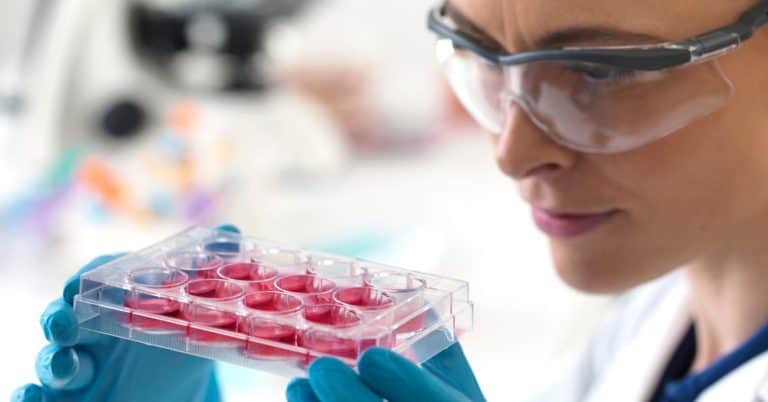Hormones influence a woman’s condition. They control mood and well-being, regulate the body’s metabolic processes, shape appearance, and ensure the stable functioning of internal organs. In case of hormone disruption or hormonal failure in women, there is an imbalance of these “building blocks” of life, which can lead to disruption of the normal functioning of the body and even cause infertility.
What is hormone disruption in women
Hormones are chemical substances that enter the bloodstream and are transported between different organs and tissues, allowing them to interconnect. They regulate metabolism and most physiological processes.
The production of hormones is controlled by two parts of the brain:
- Hypothalamus. Tracks hormone levels in the body.
- Pituitary gland. Receives data from the hypothalamus, which already decides on the creation of new hormones.
There are two main hormones produced by the ovaries. Estrogen is responsible not only for the health and elasticity of the skin, but also for the possibility of conception, and supports the normal course of pregnancy. Progesterone determines the regularity of the female cycle, and in some cases, a lack of progesterone can cause a miscarriage, a frozen pregnancy.

The hormonal background is a combination of all these hormones. This is a very sensitive environment that can change under the influence of internal and external factors – health status, age, activity level, stress, etc. In women, hormonal changes during the ovulatory cycle, during the process of carrying a child, and during menopause are also added to this list.
In a narrow sense, hormonal failure in women means a violation of the production of sex hormones, as a result of which the menstrual cycle is disturbed or the intensity of discharge changes. In a broader sense, it is a hormone disruption in the production of all hormones.
Possible causes of hormonal imbalances in women
There is not one main cause of hormonal imbalance. Usually, hormone disruption develops due to many factors – usually predictable and natural causes (menstruation, puberty, pregnancy and menopause). Other causes can be certain diseases, lifestyle, environmental conditions and endocrine gland disorders.
- Following rigid diets, anorexia, avitaminosis, tendency to obesity.
- Termination of pregnancy, especially late term.
- Taking hormonal contraceptives, which include estrogen or gestodene, without consulting a doctor.
- Early menopause.
- Taking drugs that suppress and enhance the function of the glands of internal secretion, abuse of anabolic steroid drugs.
- Carried severe infectious diseases.
- Chronic pathologies of various organs and systems.
- High levels of insulin, insulin resistance.
- Harmful habits: smoking, abuse of alcohol, caffeine and energy drinks.
- Toxins, pollutants, herbicides and pesticides.
- Severe allergic reactions.
- Hereditary diseases.
- Malfunctions in the immune system.
- Cancer affecting the endocrine glands.
- Chemotherapy or radiation therapy.
- High levels of the hormone cortisol can be observed against the background of lack of sleep, a busy lifestyle, stress.

Diseases of the female genital system, which can provoke hormonal disorders:
- uterine myoma;
- endometriosis;
- polycystic ovary syndrome (PCOS);
- polyps in the uterine cavity;
- ovarian dysfunction;
- endometrial hyperplasia.
Symptoms of hormone disruption in women
Violations do not manifest themselves sharply and some symptoms coincide with other diseases. Changes concern the reproductive system, metabolism, manifestations in appearance or mental state. But by some signs, it is still possible to determine the hormonal imbalance:
- Abrupt weight loss or weight gain
- Violation of the ovulatory cycle, intensification of PMS.
- Absence of PMS for more than six months.
- Infertility, miscarriages and other reproductive problems.
- Deterioration of hair, the appearance of dandruff, flaking skin.
- The appearance of acne on the skin of the face, acne spots.
- Striae on the body.
- Violation of the stool.
- Irritability, sudden mood changes.
- Change in the timbre of the voice.
- Insomnia.
- Decreased libido.
- Headache and depression.
Also hormonal disorders can manifest themselves in the absence of sexual activity. Women may experience loss of libido and dryness and discomfort during sexual intercourse.
What a woman should do in case of hormone disruption
In many cases, lifestyle changes should be considered as a prevention of pathological imbalance of hormones or to reduce its severity. It is desirable to observe the following recommendations:
- monitor the weight of your body, striving for its optimal parameters;
- perform regular physical exercises, lead an active lifestyle;
- follow a balanced diet rich in vitamins and trace elements;
- try to minimize stress levels as much as possible, using deep breathing, yoga, etc..;

- reduce the use of household cleaners with toxic ingredients;
- get regular check-ups to assess your health.
Conclusion
Hormonal failure is a serious disorder that can significantly affect the overall health of a woman. Its symptoms can be varied and affect not only the reproductive system, but also metabolism, psycho-emotional state and appearance. It is important to realize that the treatment of hormone disruption requires a professional approach and should not be self-medicated.
At the first signs of hormonal disorders, you should consult a doctor who will conduct the necessary examination, identify the causes of failure, and prescribe appropriate treatment. Only a specialist can competently select a therapy that will help restore hormonal balance and prevent the development of complications. Take care of your health and do not delay a visit to the doctor.





